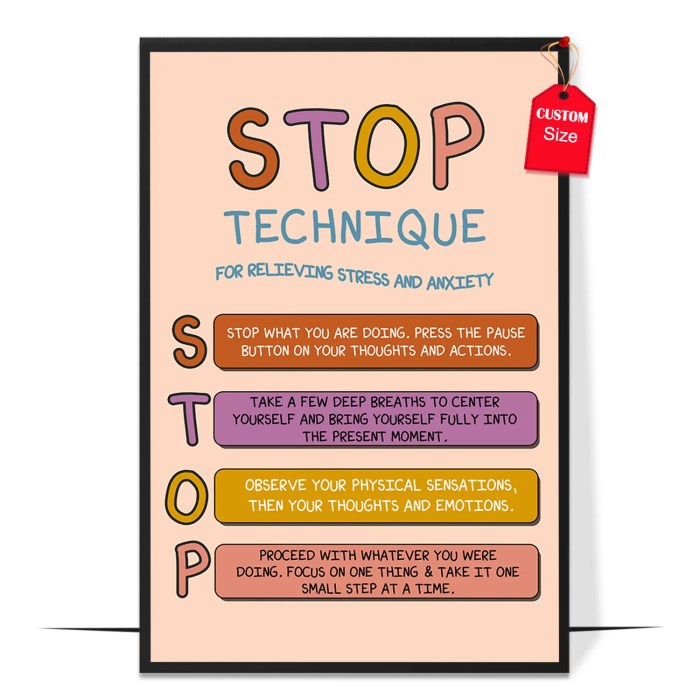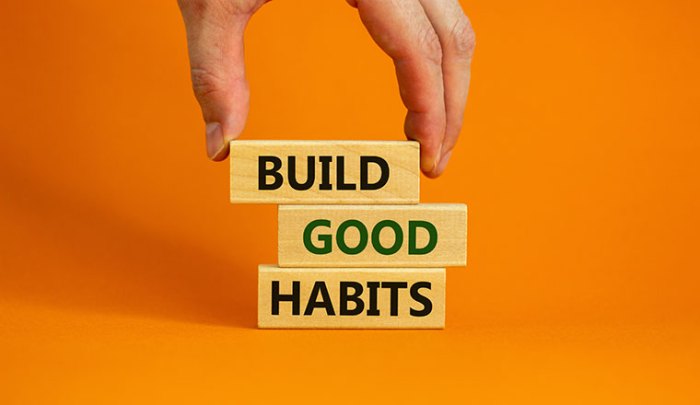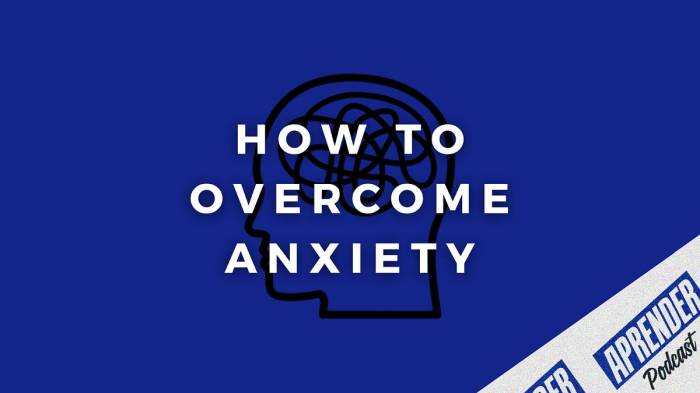7 ways truly control your own mind. This journey into the depths of self-mastery explores the fascinating interplay between your thoughts, emotions, and actions. We’ll delve into practical strategies for understanding your mind’s power, cultivating mindfulness, mastering emotions, building resilience, enhancing focus, developing self-discipline, and utilizing cognitive techniques. Get ready to unlock your inner potential and take control of your mental landscape.
Each of the seven ways offers a unique pathway to self-improvement. We’ll dissect the components of the human mind and explore how to shape them for a more fulfilling and controlled existence. The insights will not only provide theoretical frameworks but also equip you with actionable steps to transform your inner world. Prepare to embark on a transformative journey of self-discovery and growth.
Understanding the Mind’s Power
The human mind, a complex and intricate network of interconnected processes, holds a remarkable capacity for self-control. It’s not merely a passive recipient of external stimuli but an active participant in shaping our thoughts, emotions, and behaviors. This capacity allows us to navigate challenges, pursue goals, and ultimately, influence our own destinies. This exploration delves into the profound power of the mind and the various facets of mental processes that contribute to self-regulation.Understanding the mind’s power hinges on recognizing the intricate interplay of different mental processes.
These processes, while seemingly disparate, work in concert to guide our actions and shape our responses to the world around us. From the subtle nuances of attention to the powerful surges of emotion, and the driving force of motivation, understanding these processes is key to harnessing their potential for self-control. Different models of the mind offer varying perspectives on these processes, but all highlight the importance of conscious awareness and deliberate effort in directing our mental states.
Models of the Mind and Self-Control
Various models of the mind offer valuable insights into the mechanisms of self-control. The cognitive model, for example, emphasizes the role of thoughts and beliefs in shaping behavior. According to this model, negative or self-defeating thoughts can hinder self-control, while positive and constructive thoughts can foster it. The psychodynamic model, on the other hand, highlights the influence of unconscious drives and motivations on our actions.
Mastering your mind is key, and surprisingly, it’s not just about meditation. Think about how to approach writing your first novel in under 4 weeks – how to write your first novel in under 4 weeks – you need focus and a plan. Ultimately, the same mental discipline you apply to a tight deadline will help you control your thoughts and emotions in everyday life, showing you 7 ways to truly control your own mind.
By understanding these unconscious factors, individuals can gain a deeper understanding of their behaviors and potentially improve their self-control. The biological model emphasizes the role of neurochemicals and brain structures in mental processes. Research in this area reveals the importance of factors such as dopamine and serotonin in influencing motivation and emotional regulation, which are crucial aspects of self-control.
Key Components of Mental Processes in Self-Control
Effective self-control necessitates the coordinated functioning of various mental processes. These processes are not isolated entities but rather interconnected and interdependent, constantly influencing one another. Their harmonious interplay is crucial for achieving a state of mental equilibrium and effective self-regulation.
| Mental Process | Description | Examples | Implications for Self-Control |
|---|---|---|---|
| Attention | The ability to focus on a specific stimulus while filtering out distractions. | Concentrating on a task despite background noise, focusing on a conversation during a social gathering. | Maintaining attention on goals is crucial for success. Distraction can derail efforts. |
| Emotion | Subjective feelings and responses to internal and external stimuli. | Experiencing joy, sadness, anger, fear. | Emotional regulation is key. Uncontrolled emotions can impede rational decision-making and self-control. |
| Motivation | The driving force behind behavior, directed towards achieving specific goals. | Pursuing a degree, exercising regularly, maintaining a healthy diet. | Strong motivation fuels consistent effort. Lack of motivation can lead to procrastination and diminished self-control. |
Cultivating Mindfulness: 7 Ways Truly Control Your Own Mind
Mindfulness, the practice of paying attention to the present moment without judgment, is a cornerstone of mental control. It allows us to observe our thoughts and emotions without getting swept away by them, fostering a greater sense of calm and clarity. This conscious awareness empowers us to respond to challenges with greater composure and resilience. By cultivating mindfulness, we develop a deeper understanding of our inner landscape, ultimately leading to greater self-awareness and mastery over our mental processes.Through consistent mindfulness practice, we can cultivate emotional regulation, reduce stress, and improve focus.
This translates to a more balanced and fulfilling life, marked by a greater sense of inner peace. The ability to observe our thoughts and emotions without judgment is a powerful tool in navigating the complexities of daily life.
The Significance of Mindfulness in Mental Control
Mindfulness fosters mental control by interrupting the automatic, reactive patterns of thought and behavior. By focusing on the present moment, we become less entangled in the past or anxieties about the future. This allows for more deliberate and thoughtful responses, reducing impulsive actions and promoting a sense of calm amidst chaos. This ability to detach from automatic responses empowers us to make choices aligned with our values and goals.
Mindfulness Techniques and Their Impact on Mental Clarity
Numerous techniques cultivate mindfulness, each with its unique impact on mental clarity. Meditation, a cornerstone of mindfulness, involves focusing on a specific object, like the breath, to quiet the mind. This focused attention quiets the mental chatter, allowing a sense of calm and clarity to emerge. Body scan meditation, another common practice, involves bringing awareness to different parts of the body, increasing sensory awareness and grounding the mind.
Mindful walking, a more active approach, combines movement with focused attention on the sensations of walking, improving both physical and mental well-being.
Comparison of Mindfulness Practices (Meditation, Yoga)
Meditation and yoga, though distinct practices, often complement each other. Meditation primarily focuses on mental stillness, often through techniques like focused attention or open awareness. Yoga, on the other hand, integrates physical postures (asanas), breathing techniques (pranayama), and meditation to cultivate physical and mental well-being. Yoga can be seen as a holistic approach, combining physical movement, breath control, and mental focus.
The mindful movement of yoga, when combined with conscious awareness of the body and breath, enhances mental clarity.
A Structured Guide to Implementing a Daily Mindfulness Practice
To integrate mindfulness into your daily routine, start with short, consistent sessions. Begin with 5-10 minutes of meditation or a body scan. Choose a quiet space free from distractions. Focus on your breath, noticing the sensations of inhaling and exhaling. If your mind wanders, gently redirect your attention back to your breath.
Gradually increase the duration of your practice as you become more comfortable.
Comparison of Mindfulness Techniques
| Technique | Origins | Benefits | Applications |
|---|---|---|---|
| Mindful Breathing | Ancient traditions | Reduces stress, increases focus, enhances self-awareness | Daily practice, stressful situations, before meetings |
| Meditation | Eastern philosophies | Promotes emotional regulation, reduces anxiety, enhances concentration | Stress management, improving focus, cultivating inner peace |
| Yoga | Ancient Indian traditions | Improves physical health, enhances flexibility, cultivates mental clarity | Stress reduction, increasing body awareness, improving flexibility |
| Mindful Walking | Contemporary mindfulness | Enhances body awareness, reduces stress, promotes grounding | Daily walks, commutes, reducing anxiety |
Mastering Emotional Regulation
Emotional intelligence is a cornerstone of personal well-being. It’s not about suppressing emotions, but about understanding, accepting, and managing them effectively. This ability profoundly impacts our relationships, decision-making, and overall life satisfaction. Learning to navigate our emotional landscape is a journey of self-discovery and growth.Our thoughts and emotions are intricately linked. A negative thought often triggers a negative emotion, which, in turn, can lead to unhelpful behaviors.
For example, if you have a fear of public speaking (a thought), this can lead to anxiety (an emotion) and avoidance (a behavior). Conversely, positive thoughts can cultivate positive emotions, fostering resilience and a sense of well-being. Mastering emotional regulation is about creating a feedback loop where we can identify and modify our thought patterns to influence our emotional responses.
Identifying Difficult Emotions
Recognizing the nuances of our emotional landscape is crucial. This involves paying attention to physical sensations, such as a tightening chest or a racing heart, and associating them with specific emotions. Journaling, mindfulness practices, and introspection can aid in this process. Understanding the context surrounding an emotional experience is also essential. For example, a sudden outburst of anger might stem from feeling overwhelmed or unheard.
Managing Difficult Emotions
Effective emotional management involves a range of strategies. Techniques like deep breathing exercises, progressive muscle relaxation, and grounding techniques can help calm the nervous system. Cognitive restructuring, where we challenge negative thought patterns, is also valuable. For instance, instead of thinking “I’m going to fail this presentation,” one might reframe it as “I’ve prepared thoroughly, and I can handle this.”
Transforming Negative Emotions
Transforming negative emotions into positive ones requires a shift in perspective. Practicing gratitude, focusing on solutions instead of problems, and engaging in activities that bring joy can help. For example, feeling stressed about a deadline can be re-evaluated by recognizing the accomplishment of completing the task. This positive outlook leads to increased motivation and a renewed sense of control.
Emotional Regulation Techniques for Specific Situations
Different situations require different approaches to emotional regulation. For instance, when facing criticism, practicing active listening and acknowledging the validity of the feedback, while maintaining your perspective, can be helpful. In social situations, practicing empathy and understanding different viewpoints can prevent conflict and foster positive interactions.
Emotional Regulation Strategies
| Strategy | Description | Effectiveness | Daily Life Application |
|---|---|---|---|
| Deep Breathing | Slow, deep breaths to calm the nervous system. | High | Use in stressful situations, before meetings, or when feeling overwhelmed. |
| Mindfulness Meditation | Focusing on the present moment without judgment. | High | Incorporate into daily routine for stress reduction and emotional awareness. |
| Cognitive Restructuring | Challenging negative thoughts and replacing them with more realistic ones. | Moderate to High | Apply when experiencing negative self-talk or anticipatory anxiety. |
| Progressive Muscle Relaxation | Systematically tensing and releasing different muscle groups. | Moderate | Use as a relaxation technique before sleep or during periods of tension. |
Building Mental Resilience

Mental resilience isn’t about avoiding challenges; it’s about bouncing back from them stronger. It’s a crucial component of controlling your mind, allowing you to navigate life’s inevitable storms with grace and fortitude. Developing mental resilience equips you with the tools to not only survive difficult times but also thrive in the face of adversity. It’s a dynamic process, not a fixed state, and one that can be cultivated through consistent effort and self-awareness.Resilience isn’t about being invincible; it’s about developing a capacity to adapt and learn from setbacks.
This inner strength empowers us to face difficulties with a clear head, maintain perspective, and ultimately emerge stronger on the other side. This adaptability is fundamental to navigating the complexities of life and achieving our goals.
Understanding Mental Resilience
Mental resilience is the ability to adapt, recover, and thrive in the face of adversity. It encompasses the capacity to withstand stress, bounce back from setbacks, and maintain a positive outlook. It’s about building an inner strength that allows you to navigate life’s challenges with grace and fortitude. This inner strength isn’t static; it’s a dynamic process that can be honed and strengthened over time.
Strategies for Building Mental Toughness
Developing mental toughness involves actively working on specific skills and strategies. These include:
- Cultivating a Growth Mindset: Embracing challenges as opportunities for learning and growth is crucial. This mindset shifts the focus from fixed abilities to continuous improvement, allowing you to learn from failures and see them as stepping stones towards success. This approach empowers you to see challenges as opportunities to learn and develop, fostering a proactive and adaptable attitude.
- Developing Coping Mechanisms: Effective coping mechanisms are vital in managing stress. These mechanisms range from healthy outlets like exercise and mindfulness to seeking support from friends and family. Strategies for managing stress effectively are vital in navigating life’s pressures. It involves a range of techniques, from mindfulness exercises to physical activities, and importantly, building social support networks. This proactive approach to managing stress is crucial for long-term well-being.
Ever wondered how to truly control your own mind? It’s a journey, not a destination, and mastering it involves several key strategies. Learning 7 ways to control your mind is fundamental, but you can also use tools like the 15 mental tricks fight depression here to help you navigate challenging times. Ultimately, the 7 ways to control your mind give you the tools to stay focused, positive, and resilient in the face of life’s inevitable ups and downs.
- Building Strong Social Connections: Social support networks provide a crucial buffer against stress. Having supportive relationships offers a sense of belonging, reduces feelings of isolation, and provides a safety net during difficult times. Meaningful connections provide encouragement, understanding, and assistance when needed. These bonds provide invaluable emotional support and practical help during times of adversity.
Developing a Growth Mindset
A growth mindset is characterized by the belief that abilities and intelligence can be developed through dedication and hard work. This contrasts with a fixed mindset, which assumes that abilities are static and unchangeable. Cultivating a growth mindset involves embracing challenges, viewing mistakes as learning opportunities, and persevering through setbacks. This proactive approach fosters a deep sense of self-efficacy, driving personal growth and resilience.
Adversity as a Catalyst for Growth
Adversity, while painful, can be a catalyst for personal growth. When faced with challenges, we have the opportunity to learn, adapt, and develop new strengths. Experiences, both positive and negative, contribute to our character and resilience.
“The difference between ordinary and extraordinary is that little extra.”
Jimmy Johnson
Overcoming obstacles builds character and resilience. It helps us identify our strengths and weaknesses, understand our limits, and ultimately define who we are.
Mental Resilience Strategies
| Strategy | Potential Benefits | Potential Challenges | Examples |
|---|---|---|---|
| Mindfulness Practices | Reduced stress, increased self-awareness, improved focus | Requires consistent effort and practice, potential for initial discomfort | Meditation, deep breathing exercises, yoga |
| Seeking Support Systems | Enhanced coping mechanisms, reduced feelings of isolation | Finding reliable and supportive people, managing potential conflicts | Talking to friends, family, therapists, support groups |
| Setting Realistic Goals | Increased sense of accomplishment, reduced anxiety | Requires self-assessment, potential for frustration with slow progress | Breaking down large tasks into smaller steps, prioritizing needs |
| Physical Activity | Improved mood, reduced stress, increased energy levels | Requires time commitment, potential for injury | Exercise, sports, outdoor activities |
Enhancing Focus and Concentration
Unlocking your full potential often hinges on the ability to focus and concentrate. A sharp mind, capable of sustained attention, is a powerful tool for navigating the complexities of life, from academic pursuits to professional endeavors and personal growth. This crucial skill allows us to delve into tasks with dedication, leading to greater efficiency and a deeper understanding of the material at hand.
The Importance of Focus and Concentration
Focus and concentration are fundamental to cognitive function. They allow us to filter out distractions, prioritize tasks, and maintain sustained effort. This ability to concentrate on a single objective enhances our learning capacity, problem-solving abilities, and overall productivity. Without a strong foundation in focus and concentration, even the most intellectually stimulating tasks can feel overwhelming and unproductive.
Methods for Improving Attention Span
Improving attention span involves actively engaging in strategies that enhance mental clarity and reduce distractions. Consistent practice of mindfulness techniques, such as meditation and focused breathing exercises, can significantly bolster attention span. Regular physical activity also plays a critical role in sharpening cognitive functions, including attention.
Reducing Distractions
Reducing distractions is a crucial component of improving focus. Creating a dedicated workspace free from visual and auditory clutter is an important step. Learning to prioritize tasks and schedule specific blocks of time for focused work can also help minimize distractions. Actively silencing notifications and turning off social media during work sessions can significantly enhance concentration.
Strategies for Maintaining Focus During Challenging Tasks
Sustaining focus during challenging tasks often requires a proactive approach. Breaking down large tasks into smaller, manageable steps can make them less daunting and more attainable. Regular breaks, incorporating physical movement or relaxation techniques, can help prevent mental fatigue and maintain focus throughout the work session. Establishing clear goals and visualizing the desired outcome can also boost motivation and maintain focus.
Techniques for Overcoming Procrastination and Maintaining Consistent Effort
Procrastination is often a byproduct of poor time management and a lack of clear focus. Developing a structured routine that incorporates dedicated time slots for specific tasks can help combat procrastination. Setting realistic goals, breaking down tasks into manageable chunks, and rewarding oneself for completing milestones can also increase motivation and consistency.
Table of Techniques for Improving Focus and Concentration
| Technique | Potential Benefits | Potential Drawbacks | Examples |
|---|---|---|---|
| Mindfulness Meditation | Improved attention span, reduced stress, increased self-awareness | Requires consistent practice, may be challenging for beginners | Guided meditations, body scan meditations |
| Time Blocking | Increased productivity, better time management, reduced procrastination | Requires discipline and adherence to schedule, potential for rigidity | Scheduling specific time slots for work, study, or relaxation |
| The Pomodoro Technique | Improved focus, increased productivity, manageable work periods | May not be suitable for all tasks, requires discipline | Working in 25-minute intervals with short breaks |
| Active Recall | Enhanced memory retention, deeper understanding of material | Requires effort and active engagement, can be challenging for complex material | Testing oneself on learned material, summarizing information |
Developing Self-Discipline
Self-discipline is a cornerstone of personal growth and success. It’s the ability to control one’s impulses and behaviors, focusing on long-term goals despite immediate temptations. This control extends beyond simple willpower; it’s a cultivated skill that empowers us to make conscious choices aligned with our values and aspirations. This mastery is crucial for achieving a fulfilling and productive life, both personally and professionally.Self-discipline is fundamentally linked to controlling the mind.
By consistently practicing self-discipline, individuals can train their minds to resist distractions, prioritize tasks, and maintain focus. This allows for greater mental clarity and efficiency in achieving objectives. The key is to understand that self-discipline is not an innate quality but a skill that can be developed and strengthened through consistent effort and practice.
Strategies for Developing Self-Discipline
Developing self-discipline involves understanding the principles behind it and actively incorporating strategies into daily routines. Consistency is paramount. Small, manageable steps toward goals are often more effective than dramatic, unsustainable changes.
- Establishing Clear Goals: Well-defined goals provide direction and motivation. These goals should be specific, measurable, achievable, relevant, and time-bound (SMART). This clarity allows for focused effort and consistent action.
- Time Management Techniques: Effective time management is essential for prioritizing tasks and avoiding procrastination. Techniques like the Pomodoro Technique, Eisenhower Matrix, and time blocking can maximize productivity and minimize distractions.
- Building Habits: Self-discipline often hinges on consistent habits. Gradually incorporating positive habits, such as regular exercise, healthy eating, or dedicated study time, strengthens self-control over time. These habits reinforce the discipline needed to pursue long-term objectives.
- Reward Systems: Rewarding yourself for achieving milestones is a powerful motivator. This reinforces positive behaviors and fosters a sense of accomplishment, motivating continued progress.
Goal-Setting and Motivation
Goal-setting is an integral part of cultivating self-discipline. Specific, achievable, and measurable goals provide a clear roadmap for action, directing efforts toward desired outcomes. Motivational factors play a crucial role. Understanding personal values and aligning goals with those values provides intrinsic motivation, fueling the drive to persist through challenges.
Ever wondered how to truly control your own mind? It’s a fascinating journey, and delving into the 7 ways to achieve this can be incredibly helpful. But sometimes, stepping back and considering the 20 paradoxes that give wisdom and perspective 20 paradoxes that give wisdom and perspective can offer a fresh angle. Ultimately, understanding these contradictions can be a powerful tool in mastering the 7 ways to truly control your own mind.
Examples of Self-Discipline in Action
Self-discipline is applicable across diverse aspects of life. From personal finance management to career advancement, effective self-discipline enhances personal and professional success. For instance, consistent exercise demonstrates self-discipline by adhering to a routine despite potential distractions.
Self-Discipline Techniques Across Settings
| Technique | Personal Life | Professional Life | Academic Life |
|---|---|---|---|
| Habit Stacking | Pairing brushing teeth with meditation | Pairing email check with task completion | Pairing study time with a specific location |
| Goal Setting | Saving for a down payment on a house | Achieving a promotion | Completing a degree program |
| Mindfulness | Managing stress during difficult times | Remaining calm during challenging negotiations | Focusing on the task at hand during exams |
| Time Blocking | Allocating specific time for hobbies | Scheduling meetings and deadlines | Creating a study schedule |
Utilizing Cognitive Techniques
Controlling our thoughts is a powerful tool for shaping our mental well-being. This involves recognizing the intricate ways our minds process information and how cognitive biases can influence our perceptions. Understanding these mechanisms empowers us to actively participate in shaping our mental landscape. This process requires the conscious application of cognitive techniques, allowing us to navigate challenging thoughts and emotions effectively.Cognitive techniques offer a structured approach to understanding and modifying our thought patterns.
By understanding how our minds work, we can identify and challenge negative thought patterns, thereby fostering a more positive and productive mental outlook. This conscious control over our thought processes is fundamental to achieving a greater sense of mental well-being.
Cognitive Restructuring Techniques
Cognitive restructuring is a cornerstone of cognitive therapy. It involves identifying and changing negative thought patterns that contribute to emotional distress. These techniques aim to replace unhelpful, automatic thoughts with more realistic and adaptive ones. This process fosters a more balanced and resilient mental state.
Cognitive Biases
Cognitive biases are systematic errors in thinking that can lead to inaccurate judgments and flawed decisions. They often operate unconsciously, influencing our interpretations of events and shaping our emotional responses. Recognizing these biases is the first step in mitigating their impact on our mental processes. Examples include confirmation bias (favoring information that confirms existing beliefs), anchoring bias (over-reliance on initial information), and availability heuristic (estimating the likelihood of events based on how easily examples come to mind).
Identifying and Challenging Negative Thought Patterns
Identifying negative thought patterns often involves journaling or mindfulness exercises. By paying attention to our inner dialogue, we can pinpoint recurring negative thoughts and assess their validity. Challenging these thoughts involves questioning their basis, considering alternative perspectives, and evaluating the evidence supporting or refuting them. For example, if you experience the thought “I’m going to fail this exam,” you can challenge this by asking yourself, “What evidence supports this thought?
What are the chances of failure? What have I already accomplished?”
Reframing Negative Thoughts, 7 ways truly control your own mind
Reframing involves recasting negative thoughts into more positive and productive ones. This involves finding alternative interpretations of situations that emphasize strengths, resources, and opportunities. Instead of focusing on perceived limitations, reframing directs attention towards potential solutions and growth. For instance, if you feel discouraged by a setback, reframe it by thinking, “This setback provides an opportunity to learn and grow.”
Cognitive Flexibility
Cognitive flexibility is the ability to adapt our thinking to new information and perspectives. It allows us to consider various viewpoints, challenge assumptions, and adjust our beliefs as needed. This flexibility is crucial for navigating complex situations and maintaining mental well-being.
Cognitive Techniques Table
| Technique | Description | Effectiveness | Limitations |
|---|---|---|---|
| Cognitive Restructuring | Identifying and modifying negative thought patterns | High, particularly for anxiety and depression | Requires effort and practice; may not be effective for all individuals or situations |
| Thought Recording | Documenting negative thoughts and their triggers | Moderate, aids in identifying patterns | Can be time-consuming and may not address the root cause of thoughts |
| Cognitive Reframing | Changing the interpretation of events | High, particularly for improving mood | Requires conscious effort to challenge automatic thoughts |
| Decatastrophizing | Identifying and reducing exaggerated negative predictions | Moderate, helpful for managing anxiety | May not be effective for individuals with severe anxiety disorders |
Promoting Healthy Habits
Our mental well-being is intricately linked to our physical health. A healthy lifestyle isn’t just about looking good; it’s about fostering a strong foundation for mental clarity and resilience. Prioritizing healthy habits, from sleep to diet, allows us to better manage stress, improve focus, and enhance our overall mental control.A consistent and healthy lifestyle isn’t about drastic changes overnight, but rather about cultivating sustainable routines.
Small, positive adjustments, such as incorporating more fruits and vegetables or getting adequate sleep, can make a significant difference in your mental clarity and overall well-being. These improvements build a stronger foundation for managing stress, enhancing focus, and bolstering your mental resilience.
Healthy Sleep Schedule
Adequate sleep is crucial for mental restoration and cognitive function. Our brains consolidate memories and process information during sleep, directly impacting our ability to focus and learn. Maintaining a regular sleep schedule helps regulate our circadian rhythm, a natural internal clock that dictates our sleep-wake cycle.A consistent sleep schedule contributes to better mental clarity, mood regulation, and improved concentration.
It is recommended to aim for 7-9 hours of quality sleep each night to experience these benefits.
Importance of Balanced Diet
A balanced diet provides the necessary nutrients for optimal brain function. Essential nutrients like vitamins, minerals, and healthy fats support neurotransmitter production, which plays a critical role in mood regulation and cognitive processes. Nutrient deficiencies can lead to fatigue, irritability, and difficulty concentrating.A diet rich in fruits, vegetables, lean proteins, and whole grains provides the necessary fuel for a healthy mind.
Avoid processed foods, excessive sugar, and unhealthy fats to maintain optimal brain health.
Healthy Habits for Mental Control
Healthy habits are powerful tools for cultivating mental control. Implementing these habits can create a more positive and productive mindset, leading to better stress management and improved overall well-being.
| Healthy Habit | Benefits for Mental Control | Examples of Implementation | Important Considerations |
|---|---|---|---|
| Regular Exercise | Reduces stress, improves mood, enhances focus, boosts energy levels. | Aim for at least 30 minutes of moderate-intensity exercise most days of the week. This could include brisk walking, jogging, swimming, or cycling. | Start slowly and gradually increase intensity and duration. Find an activity you enjoy to maintain consistency. |
| Mindfulness Practices | Reduces anxiety, improves focus, enhances emotional regulation. | Practice meditation, deep breathing exercises, or mindful walks. Even a few minutes a day can make a difference. | Consistency is key. Start with short sessions and gradually increase the duration as you become more comfortable. |
| Hydration | Improves cognitive function, reduces fatigue, enhances mood. | Carry a water bottle and sip on water throughout the day. Aim for 8 glasses of water per day. | Dehydration can significantly impact cognitive performance. Pay attention to your body’s thirst signals. |
| Social Connection | Reduces feelings of loneliness and isolation, improves mood, provides support. | Spend time with loved ones, join social groups, or participate in activities that foster connection. | Quality over quantity. Prioritize meaningful connections and interactions. |
Concluding Remarks

In conclusion, controlling your own mind is a multifaceted process that requires understanding, practice, and a commitment to personal growth. By mastering the seven strategies Artikeld in this guide—understanding your mind, cultivating mindfulness, mastering emotions, building resilience, enhancing focus, developing self-discipline, and utilizing cognitive techniques—you can gain unprecedented control over your thoughts, emotions, and actions. This journey of self-improvement empowers you to navigate life’s challenges with greater clarity, resilience, and fulfillment.
The path to a more controlled and empowered mind begins now.











